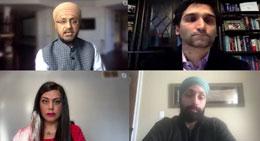Cultural messaging to fight the pandemic

By Fabian Dawson
New Canadian Media
When the call came on a Friday night before Christmas, Dr. Amrit Sehdev did not hesitate to join Canada’s South Asian front in the battle against COVID-19.
“We worked through the night and within hours had a website going,” said Dr. Sehdev, a member of the newly formed South Asian COVID Task Force, comprising South Asian physicians and health professionals in Canada.
“It has only been about a month, but we are seeing some good progress in getting the message out to get tested and get vaccinated in the South Asian and other New Canadian communities,” said Dr Sehdev, an Ontario-based public health professional, with a Masters in Artificial Intelligence (AI).
According to the group, the South Asian COVID Task Force was formed as a grassroots initiative to put “a spotlight on the specific needs of our communities and the structural barriers in place that are continuing to drive the pandemic.”
Dr Sehdev said the response from South Asian health professionals across the country to join the group and its efforts has been phenomenal.
“South Asians generally have a lot of trust in their physicians and we are using this to get our message across addressing the issues via a cultural lens,” he said.
Several South Asian doctors have also posted personal messages on the Facebook page of the South Asian COVID Task Force.
Among them is Dr. Nishma Singhal, who specializes in infectious diseases. Dr. Singhal’s video shows her on her way to get a COVID-19 shot, combined with a narrative that describes the vaccine as gift.
In her video, Pooja Gandhi, a speech language pathologist, explains the importance of making culturally appropriate information on COVID-19 accessible in Hindi.
The site also has infographics in multiple South Asian languages, including Bengali, Gujarati, Urdu, Punjabi and Malayalam, to amplify public health directives and make them more easier to understand for people whose first language is not English or French.
Inspired by the work of the South Asian Covid Taskforce, members of the Latino/Hispanic community have organised a similar group that aims to “provide education, awareness, and culturally appropriate resources to address health inequities experienced by the Latino/Hispanic community due to COVID-19.”
Dr. Sehdev said there is no doubt that COVID 19 is disproportionately impacting the health and finances of New Canadians, especially in cities like Brampton, Ontario and Surrey, British Columbia.
“In these areas, which have a high percentage of new Canadians, many live in multi-generational homes and are involved in front-line work where they face a greater risk of infection
“There is also the additional challenge of language barriers, making it even harder to access information or medical help,” he said.
But Dr. Sehdev believes the hesitancy rate in testing or vaccination is no greater than the general population, once culturally-driven advocacy and messaging become part of the arsenal to combat COVID-19.
The Taskforce also conducted a recent survey in the Peel region which found 43% of participants live with 5+ people in their households.
Vaccine acceptance was 71.4% among survey respondents with more than half of those surveyed saying they would like to get the shots at a doctor’s office.
Meanwhile, a new poll by the Angus Reid Institute (ARI) said Canadians appear to be transitioning from a place of professed caution to enthusiastic compliance when it comes to their willingness to be vaccinated against COVID-19.
In a one-month span, the number of people saying they plan to be inoculated as soon as possible has increased 12 percentage points, with a firm majority (60%) now willing, and waiting, said the poll.
“While this news may delight public health officials, it also puts them – and their political masters – under the microscope. They have been criticized for struggling in recent weeks to effectively and efficiently jab vaccines into the arms of impatient Canadians. Indeed, 52 per cent say the amount of time they think they’ll personally wait to be vaccinated is “too long”,” said ARI president, Shachi Kurl, in a statement.
Here are the some of the key findings of the ARI poll:
• Dissatisfaction with the speed and smoothness of the process is most pronounced in Manitoba and Ontario where approximately half (51% and 54% respectively) say their province is doing a “bad job” on COVID-19 vaccine distribution. More than two-in-five in Alberta (43%) also say this.
• Canadians who are willing to be vaccinated also indicate they are prepared to receive that vaccination at a variety of venues, from conventional places such as medical clinics (90%) to drive-through vaccination sites (64%).
• Men aged 55 and older are most impatient for the vaccine, with 63 per cent saying the amount of time they expect to wait for one is “too long”.









